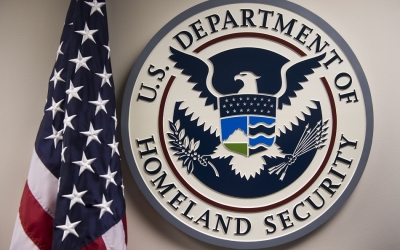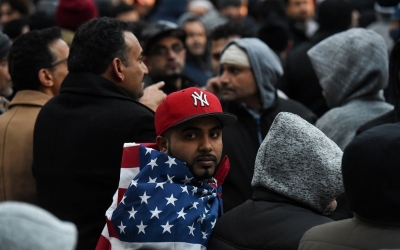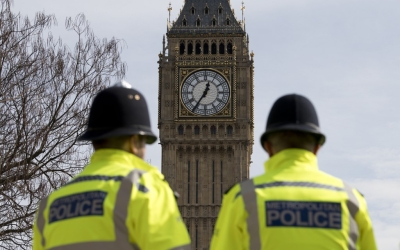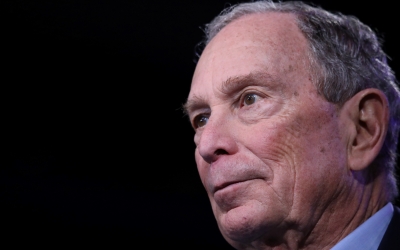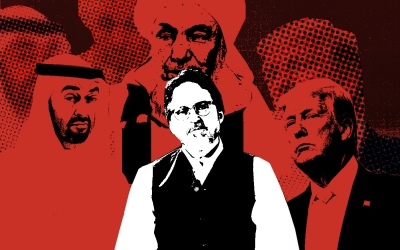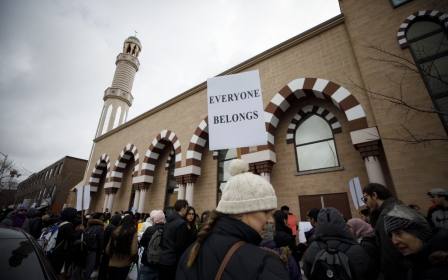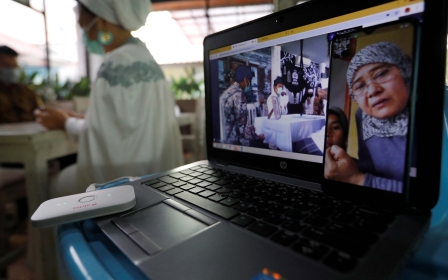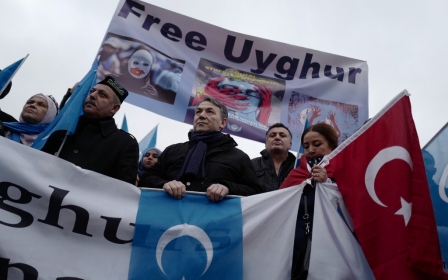New name, same game: American Muslims vow to fight new 'counter-terror' initiative
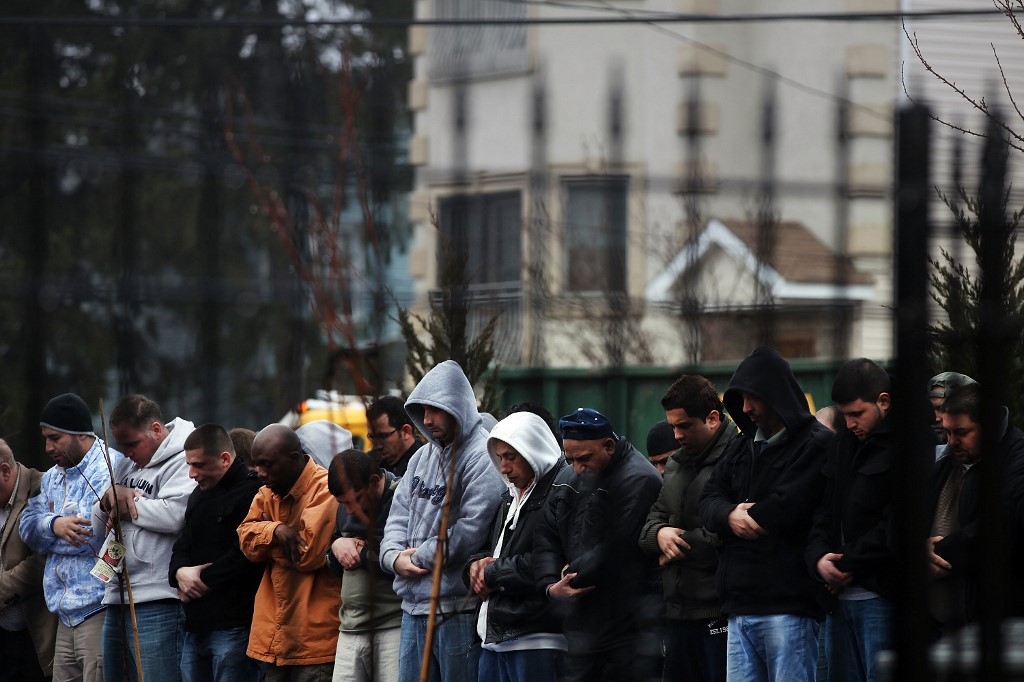
Ahmed Mohamed made headlines five years ago when he brought a homemade clock to his US public high school.
A robotics enthusiast, Mohamed loved engineering and had dreams of studying at the world-renowned Massachusetts Institute of Technology.
Still, when Mohamed tried to impress his engineering teacher with his latest invention, complete with a circuit board and a digital display, the 14-year-old's life was turned upside down.
Mohamed was escorted to his principal's office, handcuffed by police and suspended from school for three days.
'The academic research that supports CVE is really sketchy'
- Fatema Ahmed, director of the Muslim Justice League
After authorities finally realised that the clock was not a "bomb," Mohamed received messages of support from across the globe, including an invitation to visit the White House by then President Barack Obama.
New MEE newsletter: Jerusalem Dispatch
Sign up to get the latest insights and analysis on Israel-Palestine, alongside Turkey Unpacked and other MEE newsletters
"Cool clock, Ahmed. Want to bring it to the White House?" Obama tweeted. "We should inspire more kids like you to like science. It's what makes America great."
While Mohamed's story was noteworthy, the incident didn't occur in a vacuum. It was the result of an initiative introduced by Obama that almost exclusively targeted Muslims.
Last month, President Donald Trump launched a new iteration of the Countering Violent Extremism (CVE) programme called Targeting Violence and Terrorism Prevention (TVTP).
Activists have slammed the scheme, calling it a continuation of the harmful Obama-era strategy that not only fails to present convincing evidence of the causes or "drivers" of "violent extremism," but also damages Muslim and minority communities in the process.
What is CVE?
The CVE initiative was introduced by the Obama administration in 2011 as a means to curb efforts by individuals "inspired by al-Qa'ida and its affiliates and adherents" to recruit and radicalise people in the US.
The strategy was supposed to work by recruiting community leaders, social workers, teachers, imams, public health providers and others to assist the government in identifying individuals that may be "at risk" of becoming violent extremists.
Since 2011, the programme has funnelled tens of millions of dollars into research and seen grants given to organisations including schools and mental health centre as well as Muslim groups.
Pilot programmes were initially launched in the US cities of Boston, Minneapolis and Los Angeles, cities which host large Muslim communities, but they have since been rolled out elsewhere across the country.
Since its inception, the initiative has been met with resistance by some in the Muslim community largely because it casts an aura of suspicion on individuals, surveils people without their consent and continues to use entrapment as a means of securing prosecution.
Surveillance and intelligence gathering was found to have been extended to teenagers in schools and even to young children.
"What CVE does is that it creates training [materials] that tell teachers: This is what to look out for," Fatema Ahmed, executive director of the Muslim Justice League (MJL), told Middle East Eye.
The framework of CVE has also been used extensively within the State Department and for foreign policy, as it has initiated numerous programmes in the Middle East using CVE's approach to countering extremism.
From 2015 to 2017, the department spent about $497m in CVE programmes abroad.
"The State Department has a huge CVE framework focused predominantly on external countries," Ahmed said.
New name, same game
This year, a little less than a decade after CVE was created - funding programmes for policing, schools and mental health facilities - were morphed under TVTP by the Trump administration.
Reuters first reported in 2017 that under the rebranding, the programme would no longer target groups such as white supremacists who have carried out bombings and shootings in the US, but would focus solely on Islamic extremism.
According to the Department of Homeland Security, $80m had been allocated to the scheme, including $10m in grants similar to CVE grants given in 2016. Applications for grants are due on 17 June and the $10m will be disbursed in September, it said.
"Instead of funding schools, hospitals and public infrastructure in the midst of a pandemic, the federal government is allocating $80m of our tax money to target Muslim communities," said Ahmed.
"The people who are doing CVE, these types of law enforcement agencies or federal agencies think that they can rename it to essentially repackage it."
Hammad Alam, a staff attorney with Asian Americans Advancing Justice (AAAJ), agreed, describing the name change as "a smoke and mirrors kind of strategy".
"TVTP is essentially CVE. It's a rebranded program," Alam told MEE.
Modelled after the UK's controversial Prevent programme, the roots of CVE's surveillance framework can even be traced back to the targeting of Black Americans who organised for racial justice, Ahmed from the MJL said.
The rights group noted how the programme works to "legitimise discrimination" against Muslims, most visibly seen in the case of informants.
For instance, law enforcement-led community outreach programmes to Somali communities in Minnesota covertly operated as a channel for conducting surveillance, The Intercept reported in 2015.
"There's a unique sort of lens by which Muslim immigrant communities are viewed as prone to terrorism and international links," Alam of the AAAJ said.
Legitimising discrimination
While the government has touted the use of informants as a necessary tool to combat terrorism, the American Civil Liberties Union has called it discriminatory and said it creates an atmosphere of "fear and mistrust".
Other forms of this come in academic research, which the government funds to create links between Muslims and terrorism.
"That helps give a cover for these programmes, even though plenty of academics and researchers have shown that none of this makes sense," Ahmed said.
Ahmed noted that much of the research being done to ascertain whether CVE is effective is funded by CVE grants.
"You don't really find a bunch of independent people who think CVE is a great idea," she said. "The academic research that supports CVE is really sketchy."
The Brennan Center for Justice said in a report last year that the programme used discredited ideological markers and vague behavioral identifiers to find individuals at risk for extremist tendencies.
That, critics argue, has led to anti-Muslim profiling and the stigmatisation of innocent behaviours, including growing a beard, travelling to Muslim-majority countries or criticising US foreign policy.
Muslims aiding in surveillance
Rights group say that while they remain committed to stopping CVE in all its forms, the scheme would not be possible without the help of a key group of people: members of the Muslim community themselves.
They say that much of the funding mosques and community groups receive from CVE grants is opaque and hard to track, and the US government helps culture "leaders" within the Muslim community.
When the initiative was first announced in 2011, the FBI engaged with some community leaders before launching pilot programmes in 2014, Ahmed said.
"Unsurprisingly some of those leaders then applied for CVE.
"The structure of CVE is to recruit Muslim 'leaders' and deputise them - which is a facade - which makes it seem like it's a community-led effort, even though it wasn't.
"It obviously gets these agencies into the communities in ways that they can't anymore."
Some of the individuals central to the creation of CVE are Muslims like Haroon Azar, who served as the regional director in Los Angeles for the Department of Homeland Security. Others include those of Middle Eastern descent and Arab speakers.
Alam said that the reason some these individuals work with the government is to create "legitimacy" for themselves, while the government thinks it can gain currency by pushing the claim it is working with people who say they "know how these communities operate".
"It's no coincidence that many of those involved in the creation of CVE and these types of programmes are either Muslims themselves or they are of Middle Eastern descent," Alam said.
Being 'radical' is not a bad thing
Alam argues that the US domestic counterterrorism programme uses language that criminalises individuals that are either outwardly religious or fighting for equal rights.
The most contentious of these terminology debates centres around the term "radicalisation".
It was the centre of the widely debunked NYPD framework, called "Radicalisation in the West", and has been used to villanise Muslims simply for seeming to look or act religious.
The framework identifies four steps to full radicalisation: pre-radicalisation, self-identification, indoctrination and jihadisation.
Some of the signs of radicalisation it mentions include "wearing traditional clothing", "growing a beard", and "giving up cigarettes, gambling, drinking".
'From an Islamic perspective, for those of us who bring our faith practice into our work, we believe that the Prophet was a radical himself, and he brought a radical vision to the world'
- Hammad Alam, staff attorney at Asian Americans Advancing Justice
It also mentions getting "involved in social activism and community issues" as a sign of becoming an extremist. Still, within this debate, communities have been split on how to approach that term, Alam noted.
Some organisations have criticised the government's approach in surveilling the Muslim community while maintaining the language around radicalisation.
"Some organisations genuinely do feel that, yes, we have a problem with violence. We have a problem with, 'radicalisation'," Alam said.
"We think that being a radical - there's nothing wrong with that," he said.
"From an Islamic perspective, for those of us who bring our faith practice into our work, we believe that the Prophet was a radical himself, and he brought a radical vision to the world.
"And so to us, we have to defend that sort of terminology."
An uphill battle
This week, a coalition of more than 70 organisations called on the Trump administration to end its TVTP programme, highlighting the harm caused by unwarranted surveillance.
"The federal government should not, once again, waste tens of millions in taxpayer dollars on a failed, harmful surveillance program," Nabihah Maqbool, a legal fellow with Muslim Advocates, said in a statement.
"Whether they call it TVTP, CVE or another acronym, these programmes are all based on junk science and only serve to unfairly paint American Muslims and other vulnerable communities as criminals and subject them to unnecessary and dangerous over-policing."
Alam said that the name change positively highlights the advocacy work done by civil rights groups to ensure that communities are disassociated with CVE programmes.
"A lot of these name changes we feel are a direct result of our own advocacy," Alam said.
With a new name and new funding streams, however, it will be another uphill battle for groups working to eliminate unwarranted surveillance of their communities.
Still, Alam said the work they have done over the past years will not be undone, and the relationships and trust they have developed may allow them to be better equipped to combat any programmes to come.
"We've worked hard and engaged in community education for a long time," Alam said.
"There's still a lot of work to do. But we have gotten to a point where there is community recognition around these programmes and there's trust as well of our organisations and our voice to say 'Look, these are the issues; this is a problem that you should be wary of'."
Middle East Eye delivers independent and unrivalled coverage and analysis of the Middle East, North Africa and beyond. To learn more about republishing this content and the associated fees, please fill out this form. More about MEE can be found here.


